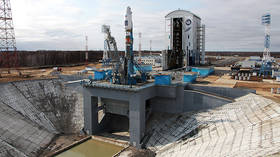'Step in the right direction': Elon Musk praises Russian Space Agency for plans to create reusable booster rockets, offers advice

Entrepreneur and SpaceX founder Elon Musk has commended the Russian Space Agency for opting to develop a reusable booster rocket. On Monday, Roscosmos said it is creating a methane rocket that can be used at least 10 times.
Writing on Twitter, Musk called it "a step in the right direction," but encouraged Roscosmos to "aim for full reusability by 2026." According to Russia's current plans, in 2026, the Amur rocket would only have a reusable methane booster.
"[A] larger rocket would also make sense for literal economies of scale," he wrote. As things stand, Russia has no reusable rockets.
It’s a step in the right direction, but they should really aim for full reusability by 2026. Larger rocket would also make sense for literal economies of scale. Goal should be to minimize cost per useful ton to orbit or it will at best serve a niche market.
— Elon Musk (@elonmusk) October 6, 2020
Musk's SpaceX corporation began developing reusable space technology in 2011, and part of their Falcon 9 rocket has been capable of re-entering the atmosphere and landing vertically since 2015. The company's current project is to develop a fully reusable rocket named 'Starship.' According to Musk, the Starship is due to conduct its first Earth-to-Earth test flights in two to three years.
On Monday, Roscosmos and the Progress Rocket Space Center signed a contract to develop a methane-powered rocket, designed to be reused for at least 10 flights. According to Alexander Bloshenko, the space agency's executive director for long-term programs and science, the rocket will cost 70 billion rubles ($900 million), and each launch will cost $22 million. Around the world, the Progress Rocket Space Center is most famous for developing the Soyuz rocket family, which was the only rocket system capable of transporting astronauts to the International Space Station (ISS) from 2011 until earlier this year.
Also on rt.com More water on Mars: Researchers say they've found SALTY LAKES under red planet’s polar ice capIf you like this story, share it with a friend!















